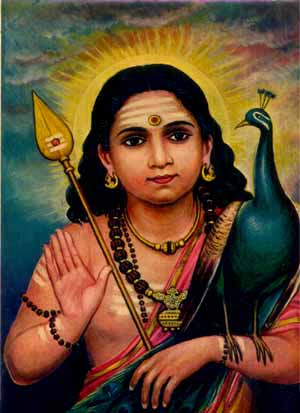 |
|
Lord Skanda-Murugan, Jnana Pandita and hero of the Skanda Purana |
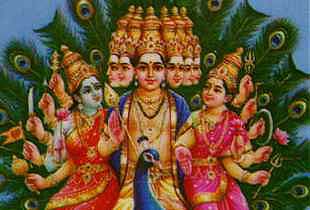 |
|
Lord Murugan with his divine consorts Valli and Teyvayanai |
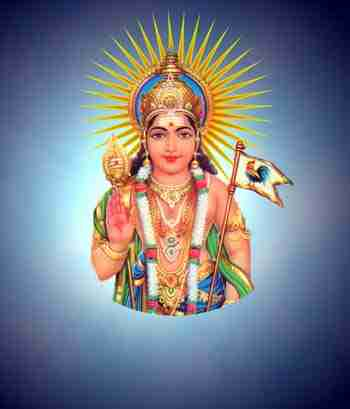 |
|
Skanda Kumara |
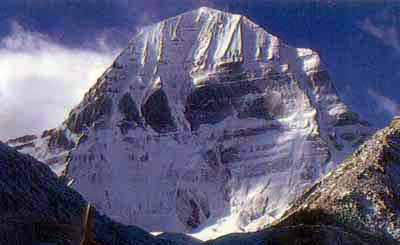 |
|
Mount Kailasa, Lord Skanda's abode in Tibet |
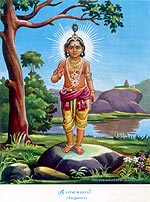 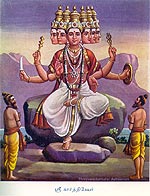 |
|
Click to visit Tiruvavaduthurai Adheenam gallery of Kaumara iconography |
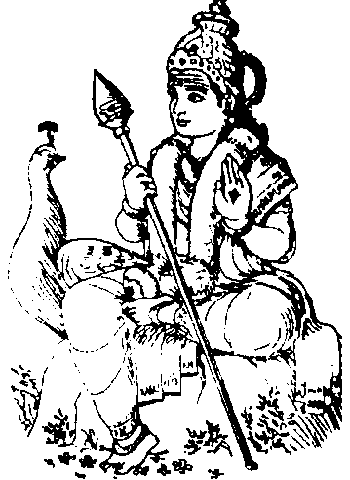 |
|
Lord Skanda-Kumara |
|
|
|
|
Kanda Puranam
Part I: Uma Devi's Penance
Introduction
Kanda Puranam, a religious
epic, is one of the greatest literary epics in Tamil. It mainly describes the
story of the rescue and redemption of the celestials from the cruel
subjugation and atrocities committed on them by the asuras whose indomitable
leader Surapadma is eventually defeated and slain by Lord Skanda.
The epic sings of the glory, grace and beatitude of Lord Skanda in rich melodious language.
The author of this immortal epic is Kachiappa Sivacharyar who functioned as the priest of Śrī Muruka's Kumara Kottam shrine in Kanchipuram, Tamil Nadu. It is believed that Lord Skanda himself initiated the task of composing the epic, on the author's behalf.
The epic (or purana as it is usually called) consists of six cantos comprising 10,345 stanzas in all.
Apart from the chief episode of the fight between Lord Skanda and Surapadma and consequent redemption of the
celestials the epic contains several other episodes such as the wedding of Siva and Uma and the nuptial tie of Lord Skanda with Teyvayanai and Valli Amma (the adopted daughter of the Veddha chief).
The book teems with several sorts of sermons, epigrams and anecdotes. It is a treasure trove of diverse
religious and philosophical ideas exposed in clear terms.
The present attempt to give an outline of the magnum opus is aimed. at providing a general view of the
contents to those who are not very familiar with Tamil, but who may be interested in knowing something about the work. With Lord Skanda's blessing, let us hope it will make interesting reading.
Prayer To Vinyaga
Adoration to the holy feet of the Lord with ten arms and five faces
To Him in whose waist-band the Sun-God
rests as a diamond stud.
To Him who bears the name of Vikata Chakkara Vinayaga.
Prayer To Subramanya
Obeisance to the Twice Three
Faces
Obeisance to the grace
flowing from the Six Faces.
Obeisance to the shoulders
held in admiration by all.
Obeisance to the Lord
residing at Kanchi mango grove.
Obeisance to the cock banner
and the peacock vehicle.
Obeisance to the shining javelin
resting in His hand.
Mount Kailasa stands majestically aloft licking the sky with its snow capped peaks. It is the abode of Siva the omnipotent Lord. It abounds with innumerable rishis and devas. Around it are
the cities of India and other regents of the spheres.
Seated with her Lord in the shrine on top of the Mount, consort Uma one day addressed Him thus. "Almighty
Lord! I had been living with Daksha who had the audacity to abuse you in his
house eating the food provided by him. I feel contaminated by his evil thoughts
and ways. I deem it a calumny to be considered his daughter. Wherefore I
earnestly pray that you help me to get rid of this stigma."
"You are right in your thought, fair one", replied Siva with a gentle smile. "The King of Himalayas is doing
great penance in order to have you as his daughter. If you so desire, you
approach him as a child. While you grow up in his mansion as his daughter, you
may engage yourself in penance with a view to reaching me. I will come to you
at the proper hour, wed you and take you back to Kailasa."
Uma received these words with mixed feelings. She was sad to be parted from her Lord, but was happy to be got
rid of the blemish of being the daughter of Daksha. Instilled by the love for
her Lord and compassion for the inhabitants of the world at large Uma Devi left
Mount Kailasa and proceeded to the Himalayas. The snow-clad Himalaya Mountain
with blue clouds floating constantly over its peaks resembled the serpent abode
of Lord Vishnu and Lakshmi encircled by the milky ocean.
The King of Himalayas was engaged in doing penance in a beautiful pond on a slope of the mountain with
the view to be blessed with the boon of having Uma Devi as his daughter and
then getting her wedded to Lord Siva. In front of him, on a lotus flower appeared
the Goddess Mother of the whole world, as a lovely child. The thought that Uma
had deserted Siva to be his child was painful to the King. He even blamed
himself for having performed such severe penance that had resulted in
separation of the supreme Lord and Lady. However he comforted himself with the
belief that it's all God's design with the common weal in mind and salvaged
from grief thus, he floated on bliss. He lifted the child that lay in the
flower bed carried it home and gave it unto his Queen who found no words to express her joy.
It is indeed in materialistic parlance we say that the royal couple brought up the child, for it is the
mother Uma's grace that protects and looks after us.
As soon as the child Uma reached five years of age she told her adopted parents of her desire to perform
penance with a view to attaining Lord Siva's favor.
"It does not behave you my child to set your mind on such severe and enormous task at such a tender age,"
said the King to Uma. "Therefore give up the idea of penance for the time being."
Uma Devi smiled at these words and said, "It is Iswara who protects us all. One cannot guard oneself without
the benign grace of the Universal Guardian. The idea of penance was indeed
induced by the Lord's grace. Hence let there be no objection to my plan."
The Himalayan King spoke no further but made the necessary arrangements for her daughter to perform the penance. He put up an enclosed stall and sent as bevy of maiden as companions. Uma Devi
took leave of her parents, entered the penance hall accompanied by a group of
lasses and started praying.
Meanwhile at Mount Kailasa the four sages Janaka, Sanatana, Sanantara and Sanat Kumara fell prostrate at the
feet of Lord Siva and said, "Lord Almighty we have gone through the whole gamut
of the entire sacred works, the four scriptures the 28 agamas and the related
works. We have been tossed about on the sea of scriptures by the storms of
delusion caught in the darkness of ignorance, feel blindfolded and placed in a
confounded state. We earnestly entreat you to enlighten us on the ultimate truth."
The Lord acceded to the request of the ascetics and with spotless penance sat himself under a pipal tree
bidding them to be seated before Him. In an atmosphere of perfect serenity
ordering Nandi Deva not to allow anyone into the enclosure, Siva started expounding
the intricate and mysterious realities capsulated in the Sivagamas.
On completion of the exposition of the three paths of attainment viz., Charya, Kriya and Yoga, the ascetics requested the Lord to make clear to them the Jnana Marga. Siva without replying closed
his eyes kept a hand against his heart and sat like a yogi in perfect composure
for a few moments, signifying to them the esoteric implication of jnana mudra.
When the Lord represented through the nature of jnanam the ascetics realized
that such supreme mystic knowledge could not be attained through book learning.
While the Lord was engaged thus in enlightening the sages about the device of concentration and spiritual meditation, the whole world was rendered desireless, bereft of carnal yearnings. On the
extreme Siva sat motionless an embodiment of impassivity. In Himalayas Uma Devi
too sat motionless mentally chanting Siva's various names intermittently repeating Panchaksara.
"In such a situation, how can we expect a son from Siva," thought Indra, the chief of the celestials. Along
with Brahma, he approached Vishnu and complained of his grievance.
Lord Vishnu listened patiently and said, "If Siva our over Lord as well as the cause of all creations were to
remain immersed in profound contemplation oblivious of the world's happenings
with all his activity inward turned, there is no possibility of his turning
towards love. I will tell you of a plan. Send Manmata the god of love to Siva
to induce him and awaken his feelings by shooting flower shafts that would
kindle his passion for Uma".
This appeared to be a good suggestion to Indra. Together with Brahma the Lord of the clouds (Indra)
approached Manmata and broached the subject of their plan. Though the god of
desire first protested, he finally yielded to the coaxings and caplings of
Indra. Manmata set out with his wife Rati to the mountain where Siva dwelt. It
was spring and the trees were putting forth new colorful flowers, birds and
beasts were mating. Only Siva remained unmoved in his mystic silence.
Even Manmata was daunted at the sight of Siva's loveliness, however he took courage. He chose a moment when
Siva seemed to relax his concentration. He stringed his bow and was about to
shoot. Lord Siva saw him and darted a flash of fire from his third eye
consuming Manurata utterly. Rati, Kama Deva's consort, fell unconscious, but
regaining her senses soon she entreated Siva to give back her husband's life.
Siva graded her request with some limitation. "His life will be given back to you on the day when Uma
becomes my lady. From that time he will be unseen by others though visible to
you." So saying he again sank into repose.
Indra, Brahma and the other gods who had been watching all this from a distance were utterly struck with
grief and remorse. "We sent Kama Deva with the intention of distracting the
Lord from his yogic involvement. Not only has our plan misfired but it has cost
the life of our cherished Kama Deva. It is unfortunate that God Siva has not
renounced his yogic state."
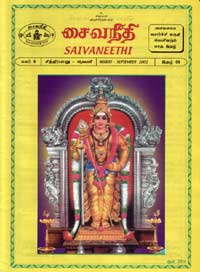 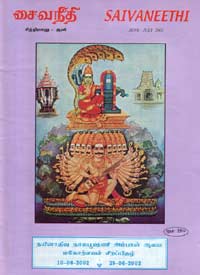 |
|
Kanda Puranam is published by courtesy of Saivaneethi magazine |
Then they came to the conclusion that the only way of redemption was to appeal to Lord Siva with the
permission of Nabdhi Deva. They approached the Lord and making a submission of
their grievances begged him not to make any further delay in saving them from
the asura. They particularly reminded Lord Siva of the promise he earlier made
to beget a son in his own form and stature.
"Be merciful, oh Lord! Will you not consider the pathetic plight we are in? How long can we bear the atrocities
of the asuras? We are daily dying inch by inch by the inhuman, ill-treatment
of Surapadma Deign to drive our sorrows 0 Lord!"
Lord Siva glanced at them with grace shedding eyes and spake thus: "Your request will be granted and your
sorrows will cease with the appearance of Skanda."
The devas felt happy and took leave of the Lord and retired to their respective abodes.
To be continued...
Saivaneethi March-April 2001
By V. Sivarajasingham

| 









